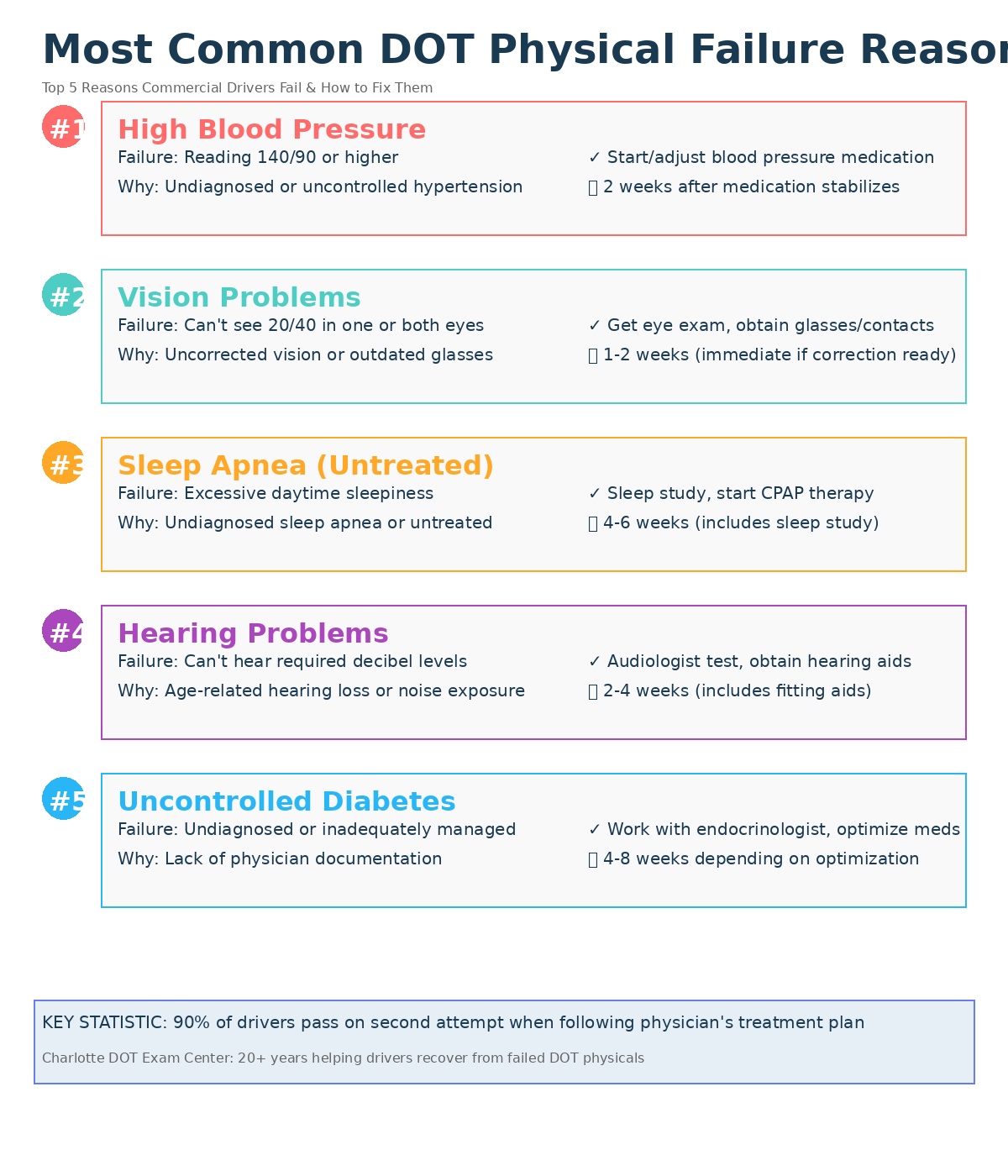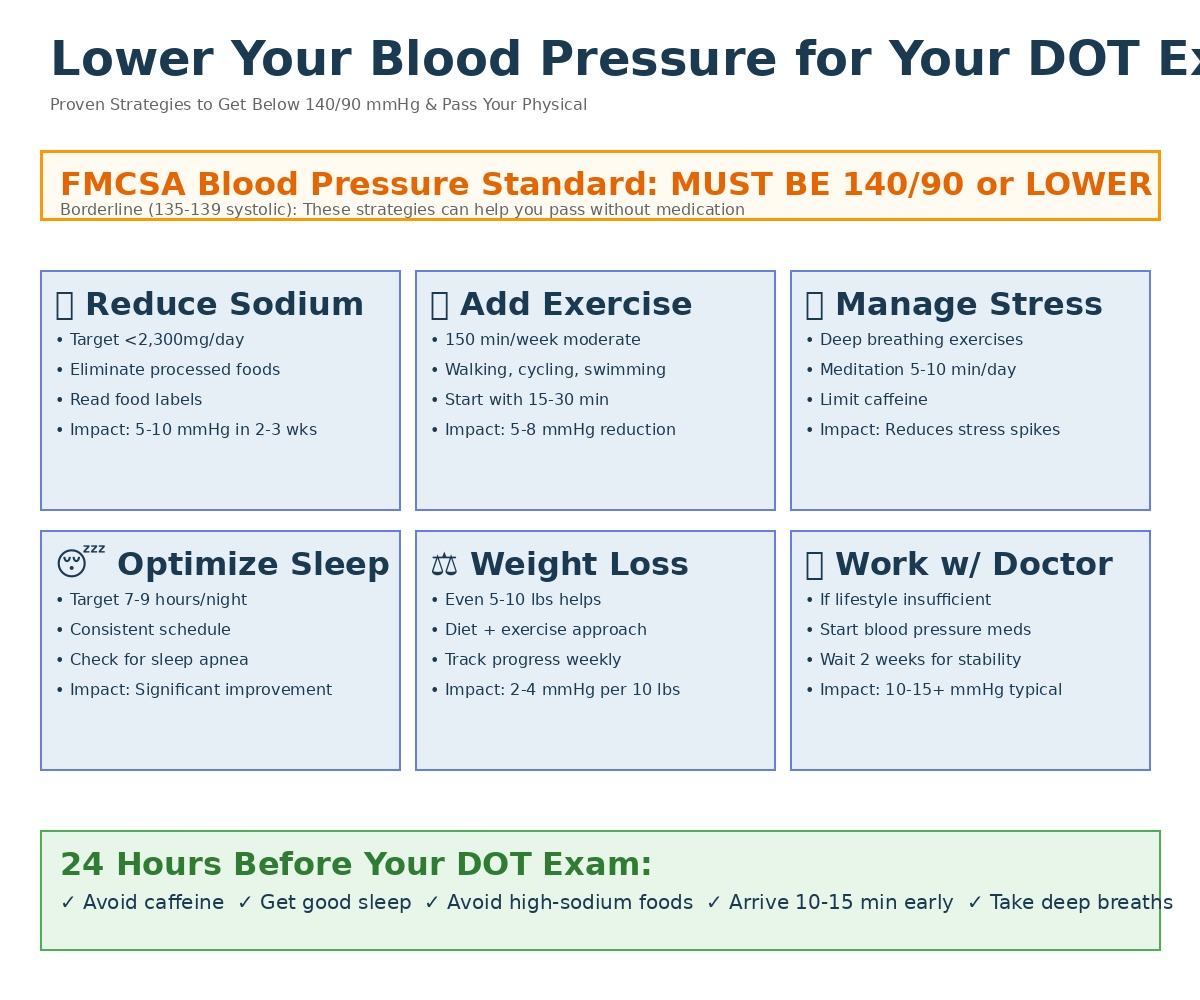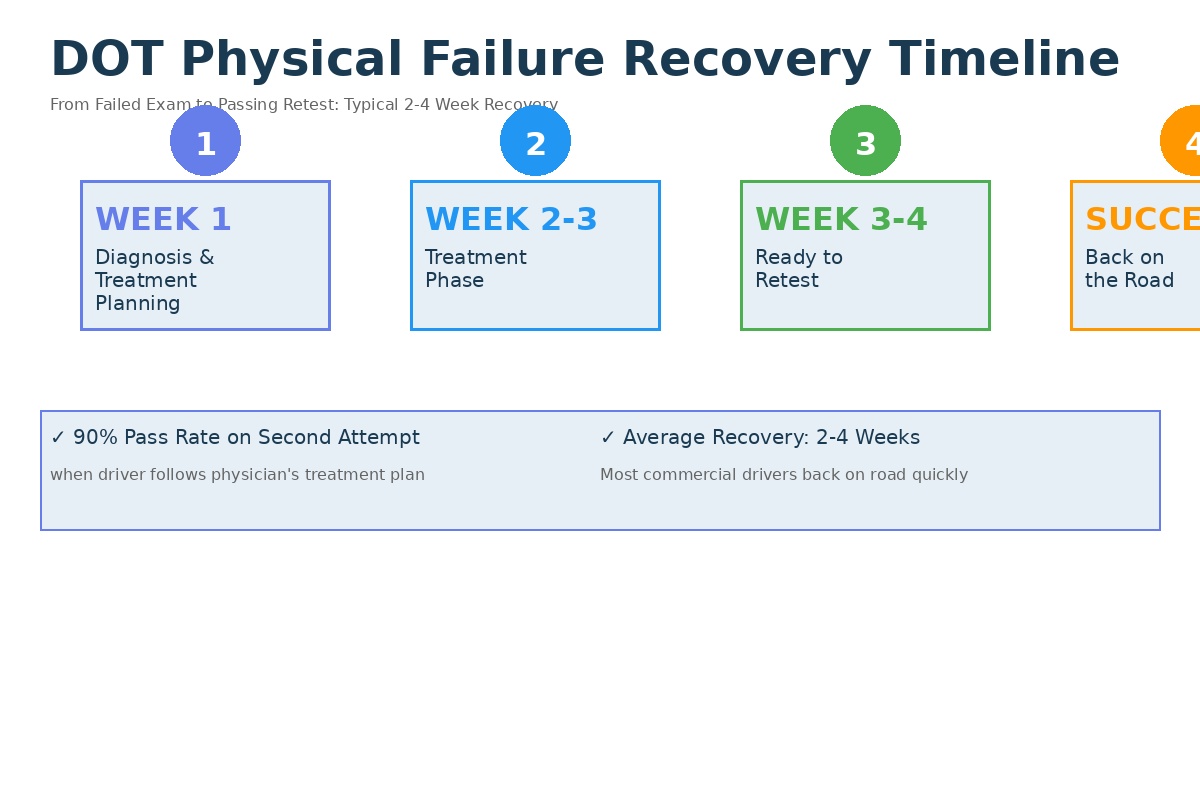Medication adjustments are often the key to passing your DOT physical after an initial failure. The FMCSA has specific requirements about which medications are acceptable and which disqualify drivers, but many common conditions respond quickly to medication changes. Understanding how to work with your physician and communicate medication changes to your DOT examiner helps you move through the process efficiently and increases your likelihood of passing.
Understanding DOT Medication Standards
The FMCSA has clear guidelines about medications that disqualify drivers and those that are acceptable with proper management.
Medications that disqualify commercial drivers
Certain medications inherently disqualify drivers because they impair judgment, alertness, or motor control. These include narcotic pain medications (oxycodone, hydrocodone, morphine), benzodiazepines (Valium, Xanax, Ativan), barbiturates, and stimulants prescribed for non-ADHD conditions. Amphetamines prescribed for ADHD in adults typically result in medical waiver requirements. Anti-seizure medications often require specialist evaluation. Antipsychotic medications generally disqualify drivers unless prescribed for specific conditions documented by psychiatry.
Medications generally acceptable for DOT drivers
Most blood pressure medications (lisinopril, metoprolol, amlodipine) are acceptable and expected for cardiovascular management. Diabetes medications including metformin, insulin, and GLP-1 agonists are acceptable if blood glucose is controlled. Most antidepressants (sertraline, citalopram, escitalopram) are acceptable if stable and non-sedating. Thyroid medications are acceptable. Statins and other cholesterol medications are acceptable. Asthma inhalers are acceptable.
Medications requiring documentation or special consideration
Some medications require the DOT examiner to document that you’re functioning safely. Sleep aids like low-dose diphenhydramine need documentation showing you take them only at bedtime. Anti-inflammatory medications like naproxen are acceptable but should be documented. Allergy medications are acceptable if non-sedating formulations are used.
Working with Your Physician on Medication Adjustments
Your physician should understand both your specific DOT exam failure and the FMCSA medical standards before making medication recommendations.
Providing your physician with DOT exam failure details
When you meet with your physician after a failed DOT exam, bring the specific failure reason. Instead of saying “I failed my DOT physical,” explain “My blood pressure was 182/108, and the DOT standard is 180/110.” This specificity allows your doctor to adjust medications precisely to meet that threshold, rather than vague blood pressure management.
Discussing medication options with your doctor
Ask your physician which medication options are available and which will most reliably bring your measurements below the DOT threshold. If your current medication isn’t achieving DOT standards, discuss whether dosage increase, medication change, or combination therapy would be most effective. Ask specifically about medication stabilization timeline—most blood pressure medications stabilize within 2 weeks.
Explaining your commercial driving requirement
Your physician should understand that your livelihood depends on maintaining DOT certification. This context helps them prioritize medication regimens that reliably keep you compliant with DOT standards. Discuss whether your current medication provides adequate margin above DOT thresholds or whether you’re borderline, which affects reexamination timing.
Pre-Exam Medication Discussions with Your DOT Examiner
Transparency about medication changes before your reexamination increases your examiner’s confidence in your stability and compliance.
What to tell your examiner during pre-exam check-in
When you arrive for reexamination, inform the examiner of any medication changes since your initial exam. State the change matter-of-factly: “My physician increased my blood pressure medication from lisinopril 10mg once daily to lisinopril 20mg once daily.” This demonstrates you’ve taken action to address the failed condition.
Timing of medication changes relative to examination
Ideally, you’ve been taking the new medication for at least 5-7 days before reexamination, long enough for most medications to show initial effect but not so long that you’re overdue for reexamination. Don’t wait for perfect stabilization (4 weeks); 2-3 weeks of medication use with documented improvement is sufficient.
Documentation to provide your examiner
Bring a written list of all current medications including drug name, dosage, and frequency. Example: “Lisinopril 20mg once daily, started October 20, 2025.” Include the date the medication was started so your examiner can assess whether sufficient time has passed for stabilization. If your physician provided written documentation recommending the medication change for DOT compliance, that carries significant weight.
Common Medication Adjustments for DOT Compliance
Blood pressure medication optimization (most common adjustment)
If you failed due to elevated blood pressure, your physician typically either increases your current medication dosage or adds a second medication. Lisinopril (an ACE inhibitor) is often increased from 10mg to 20mg or 40mg. Alternatively, a second agent like amlodipine (Norvasc) is added at 5mg. This combination approach often brings blood pressure below DOT standards within 2-3 weeks.
Timeline: 2-3 weeks for effectiveness. Reexamination: Schedule 3-4 weeks after adjustment to allow full stabilization.
Medication discontinuation for DOT compliance
If you’re taking a medication that disqualifies you from DOT driving and it’s not essential (such as a sedating antihistamine for seasonal allergies), your physician may recommend discontinuation. This eliminates the disqualification immediately. If the medication is essential (psychiatric medication), specialist consultation determines whether alternative medications or medical waiver evaluation is appropriate.
Medication interaction management
Occasionally, DOT failure results from drug-drug interactions rather than a primary condition. For example, combining certain blood pressure medications can cause dizziness. Your physician adjusts the regimen to eliminate the interaction. This typically requires only 1-2 weeks for new drug levels to stabilize.
Dosage timing adjustments
Some drivers fail their DOT exam because they take medication at irregular times. Your physician may recommend taking blood pressure medication at the same time each morning. This consistency improves blood pressure stability and can result in lower readings. Reexamination within 2 weeks often shows improved results from timing optimization alone.
Documentation Requirements for Medication Changes
Essential documents to collect from your physician
Medication adjustment record: Your physician’s note documenting the specific medications prescribed, dosages, and start dates. This should reference the DOT failure reason. Medical justification: Documentation explaining why the medication change addresses your DOT exam failure. Current medication list: Complete list of all current medications, dosages, and frequencies, from your pharmacy or physician.
What your DOT examiner reviews
Your examiner checks whether you’re taking medications that are DOT-approved, whether you’ve been on the current regimen long enough for stabilization, and whether your current vital signs or clinical findings align with medication changes. Examiners have clear FMCSA guidance on medication acceptability and stabilization timelines.
Importance of accurate medication history during reexamination
During your reexamination, you’ll complete the medical history form again. Be completely accurate about your current medications—list every drug, supplement, and over-the-counter medication you’re taking. Discrepancies between your stated medications and what your examiner observes (such as signs of medication effects) raises concerns about reliability.
Preparing for Reexamination with Medication Changes
Before your reexamination appointment
Take your medications as prescribed—don’t skip doses or double-dose before your exam. Take your blood pressure or blood glucose at home daily for one week before reexamination to document stability. Bring these logs to your exam. Keep the original prescription bottle or pharmacy printout showing your current medications.
Timing medication around your exam
Take morning medications as you normally would, including your DOT exam day. If you take blood pressure medication in the morning, take it before your reexamination exam. The examiner expects to see the medication’s effect; discontinuing medication to “show your natural baseline” will result in failure.
Consistency between exams
Your reexamination should show consistency with your medication regimen. If you were on lisinopril 10mg at your failed exam and are now on lisinopril 20mg, your examiner expects to see lower blood pressure measurements that reflect the higher dosage. If measurements haven’t changed, your examiner may question medication adherence or effectiveness.
Contact Charlotte DOT Exam Center
Our FMCSA-certified medical examiners understand medication management for DOT compliance. We can clarify which medications are DOT-acceptable and answer questions about how medication changes affect your reexamination.
Phone: 704-544-3494
Hours: Monday-Friday 9am-5pm, Saturday 9am-12pm
Location: 8415 Pineville-Matthews Road, Charlotte, NC
Related Articles

I am the administrator for the Charlotte DOT Exam facility, located in Charlotte NC. I oversee the facility services providing DOT exams in accordance with the standards of the FMCSA. We also provide DOT drug testing with MRO support when required. Drug testing can also be done for non-DOT exams such as pre-employment. In order to minimize wait times, I always encourage our clients to contact us first and make an appointment.
I would also suggest that each individual wanting to test for the CDL health card read the article “Preparing For Your DOT Exam” as it lists several things to bring to the test, such as CPAP usage reports and medicine lists.




